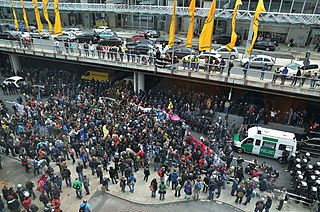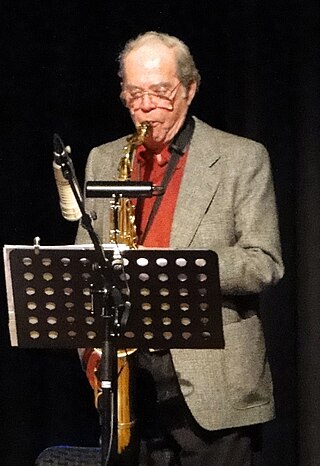
The Deutsches Jazzfestival (German Jazz Festival) is an annual jazz festival in Frankfurt, Germany. Staged since 1953 in Frankfurt-am-Main, it is the oldest German Jazz Festival and it is the oldest continually held jazz festival in the world.

The Deutsches Jazzfestival (German Jazz Festival) is an annual jazz festival in Frankfurt, Germany. Staged since 1953 in Frankfurt-am-Main, it is the oldest German Jazz Festival and it is the oldest continually held jazz festival in the world.
The festival was first organised by the German Jazz Federation as an exhibition aiming to showcase the best that Germany had to offer in jazz, as explained by Olaf Hudtwalcker at the opening of the first festival (3 May 1953). In fact, there was no significant German musician that has not played at the Frankfurt Festival. The festival was in the 1950s the annual jazz event in West-Germany and provided the main impetus for German jazz.
With the advent of other festivals in the 1960s, the festival had to take more into account the international scene. Most significant German musicians, however, were away from the everyday routine, collaborating with prominent jazz musicians from Europe and non-European countries, especially in North America. The festival allowed the meeting of Volker Kriegel with Alan Skidmore (1972), Heinz Sauer with George Adams (1978), Peter Giger with Archie Shepp (1980), Alfred Harth with David Murray (1995) and Eberhard Weber with Pharoah Sanders (1997). Caterina Valente, Theo Jörgensmann, Markus Stockhausen, Lauren Newton, Christof Lauer, Michael Sagmeister, Torsten de Winkel and Christopher Dell all started out at the festival as "newcomers".
In the course of its existence, the central organization of the festival has changed: The German Jazz Federation no longer belongs to the organizers; unlike its first decades it is no longer organised by Lippmann and Rau. 1984 saw the local broadcaster Hessischer Rundfunk becoming the organizer of the festival, and since 1990 the City of Frankfurt itself has acted as a solid partner. The festival is now fully broadcast on the radio.
Between the 1960s and the 1980s, the event was held every two years. Since the early 1990s, it is again being held annually, just as it was in the first decade of its existence.

The Eurovision Song Contest 1957 was the second edition of the annual Eurovision Song Contest. Organised by the European Broadcasting Union (EBU) and host broadcaster Hessischer Rundfunk (HR) on behalf of ARD, the contest, originally known as the Grand Prix Eurovision de la Chanson Européenne 1957 was held on Sunday 3 March 1957 and was hosted at the Großer Sendesaal des hessischen Rundfunks in Frankfurt, West Germany by German actress Anaid Iplicjian.
Germany was represented at the Eurovision Song Contest 1957 with the song "Telefon, Telefon", composed by Friedrich Meyer, with lyrics by Ralph Maria Siegel, and performed by Margot Hielscher. The German participating broadcaster on behalf of ARD, Hessischer Rundfunk (HR), selected its entry through a national final. In addition, HR was also the host broadcaster and staged the event at the Großer Sendesaal des hessischen Rundfunks in Frankfurt.

Ensemble Modern is an international ensemble dedicated to performing and promoting the music of contemporary composers. Formed in 1980, the group is based in Frankfurt, Germany, and made up variously of about twenty members from numerous countries.

Hessischer Rundfunk, shortened to HR, is the German state of Hesse's public broadcasting corporation. Headquartered in Frankfurt, it is a member of the national consortium of German public broadcasting corporations, ARD.

The Frankfurt Radio Symphony is the radio orchestra of Hessischer Rundfunk, the public broadcasting network of the German state of Hesse. Venues are Alte Oper and hr-Sendesaal. Music director is the French conductor Alain Altinoglu. Chief conductors have brought in Russian, Nordic and French influences. The orchestra has been one of the leading Mahler and Bruckner orchestras internationally. The hr-Sinfonieorchester with 108 musicians is the third oldest in the ARD.
Popkomm was an international trade show for the music and entertainment business during the 1990s and 2000s, and also integrated a congress and festival. It was held in Cologne for most of its existence, later moved to Berlin with entries from at least 55 other countries.
An overview of the evolution of Jazz music in Germany reveals that the development of jazz in Germany and its public notice differ from the "motherland" of jazz, the US, in several respects.

Horst Lippmann was a German jazz musician, concert promoter, writer and television director, best known as promoter of the influential American Folk Blues Festival tours of Europe during and after the 1960s.
Just Music were a German avant-garde music ensemble, an interchangeable collective of classically trained instrumentalists founded at the centrum freier cunst, Frankfurt/Main in 1967 by multi-instrumentalist Alfred Harth. An inherent anti-commercial bias kept them at arm's length from the mainstream music business, enabling them to experiment at will. Just Music changed their name several times depending on the context.

The Historic Railway, Frankfurt or HEF is a German museum railway in Frankfurt am Main. The society was founded in 1978 and its aim is the preservation of historic, valuable railway materiel in working order, especially steam locomotives, as technical and cultural monuments.

The Rheingau Musik Festival (RMF) is an international summer music festival in Germany, founded in 1987. It is mostly for classical music, but includes other genres. Concerts take place at culturally important locations, such as Eberbach Abbey and Schloss Johannisberg, in the wine-growing Rheingau region between Wiesbaden and Lorch.

Maria Baptist is a German musician and professor.

hr-Sendesaal, formerly Großer Sendesaal des Hessischen Rundfunks is a music hall and former television studio based in Frankfurt am Main, Germany. The hall is part of the Broadcasting House Dornbusch, the former headquarters of the German public broadcaster Hessischer Rundfunk (HR).

Blockupy is a movement protesting against austerity. The Blockupy alliance includes trade unions and Germany's Linkspartei.

Walter Jakob "Joki" Freund was a German jazz saxophonist.

Christoph Siebert is a German choral conductor, coaching and directing ensembles including the Collegium Vocale Gent. He is also an academic teacher in the field.
Wolfram Röhrig was a German pianist, composer and conductor, who also worked under the alias Wolf Droysen. A jazz pianist, he was the director of music departments of the broadcasters Hessischer Rundfunk and Süddeutscher Rundfunk, responsible for light music and jazz. With the choir Nürnberg Lehrergesangverein from Nuremberg, Germany, he performed and recorded works such as Te Deum compositions by Anton Bruckner and Heinrich Sutermeister, and Max Reger's Der 100. Psalm.

Hans Otto Jung was a German viticulturist, jazz musician and patron of music. In the 1940s, he played as a pianist in the Hotclub Combo, which he cofounded with Emil Mangelsdorff and others. In 1987, he was a cofounder of the Rheingau Musik Festival. With his wife Ursula Jung, he sponsored cultural initiatives in the Rhein-Main region.
Otto Frickhoeffer was a German composer and conductor.
AFN Frankfurt was a radio station in Frankfurt, Germany, that was operational from 1945 to 2004. It was a part of the American Forces Network (AFN) broadcasting to US soldiers serving overseas, and long served as headquarters of AFN Europe. It was popular not just with soldiers, but also with a German "shadow audience", and was instrumental in introducing several American musical styles to German listeners.